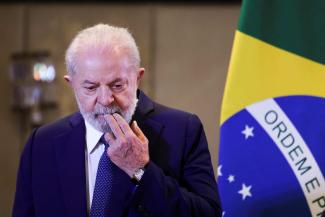G20
Social presidency in difficult times
 picture-alliance/REUTERS/Anushree Fadnavis
President Lula da Silva at this year’s G20 summit in New Delhi.
picture-alliance/REUTERS/Anushree Fadnavis
President Lula da Silva at this year’s G20 summit in New Delhi.
From 1st of December 2023 to November 2024, Brazil will take on the rotating presidency of the Group of 20 (G20), which now actually comprises 21 members, following the admission of the African Union at the last summit in India.
The Brazilian government will therefore be responsible for organising the summit of heads of state and government as well as the G20 ministerial meetings in 2024. Brazilian President Luiz Inácio Lula da Silva is hoping to make the G20 presidency a foreign-policy milestone that will cement Brazil’s return to the international stage following the isolationist government of his right-wing extremist predecessor, Jair Bolsonaro.
The main duty of the presidency is to steer the agendas of working groups, task forces and initiatives. It also includes the establishment of a series of so-called engagement groups, which lend a voice to representatives from business (B20), labour (L20), science (S20), women (W20), youth (Y20) and civil-society organisations (C20). The Brazilian government is preparing an eventful programme for 2024 in 15 cities, culminating in the summit in Rio de Janeiro on 18 and 19 November 2024.
A difficult consensus-building process
Brazil is assuming the G20 presidency at a time in which geopolitical fragmentation and the formation of political blocs is making political consensus building more difficult within the international community, as the last G20 summit in India showed.
Maintaining the relevancy of the G20 is the main task of 2024. The G20 brings together both the emerging economies that make up the BRICS group and the industrialised nations that form the Group of 7 (G7). China recently achieved an expansion of BRICS, despite scepticism from India and Brazil, and boycotted the last G20 summit in India. It will be a significant challenge for Brazilian diplomacy to deliver tangible and relevant results and build consensus.
In India, Lula da Silva announced the following priorities:
- climate and sustainable development,
- reforming multilateral institutions,
- poverty reduction, fighting social inequality and food security,
- fair taxation, foreign debt, new approaches to development finance and restructuring global finance governance,
- racism and gender equality as cross-sector issues.
In particular, Brazil has long advocated for the UN Security Council to admit new permanent members. The Brazilian presidency offers an opportunity to promote these reforms, especially against the backdrop of geopolitical restructuring due to Russia’s attack on Ukraine, China’s new role as an emerging power and the paralysis and mutual blockade of Security Council veto powers in response to the terrorist attacks by Hamas and Israel’s military occupation of the Gaza Strip.
In some ways, Brazil could proceed differently and more innovatively than its predecessors. For example, Lula da Silva is striving for a G20 process with social participation. A social summit is planned to take place in the immediate run-up to the G20 summit in November 2024. It would mark a significant change. The G20 process has never offered much room for civil society involvement. Only a few non-state actors have participated in meetings in the past.
Particularly with regard to global economic and financial systems, Brazil wants to open up discussions to civil society and other actors organised in the engagement groups. They are supposed to enter into direct dialogue with the group of Sherpas (who work as mediators on behalf of foreign ministries to steer the G20 process and negotiate final declarations) and contribute their own policy statements.
Brazil’s priorities align with the principles of a just transition, which also guide German development cooperation. Therefore, the Brazilian presidency offers Germany an opportunity to promote these issues internationally and through dialogue.
Luiz Ramalho is an independent development consultant and former GIZ senior manager.
ramalho.berlin@gmail.com


